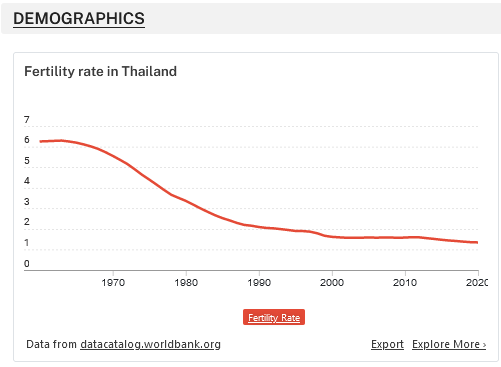-
Posts
1,723 -
Joined
-
Last visited
Content Type
Events
Forums
Downloads
Quizzes
Gallery
Blogs
Everything posted by Misty
-
Can you post more information about American Treaty of Amity companies not requiring Thai employees for foreigners with work permits? I'm not saying this isn't true, but I've owned and run such a company for many years. The Thai employee requirement has always been necessary. We've had solid legal advice. I've never heard of these "complicated rules" and so am a bit skeptical if the complicated rules from a Thai lawyer don't just involve some kind of "VIP service fee."
-

Stormy Daniels: Trump invited to testify before grand jury
Misty replied to onthedarkside's topic in World News
Didn't Stormy say "like a toadstool." Could put some off. -

Silicon Valley Bank collapses after failing to raise capital
Misty replied to Scott's topic in World News
Peter Thiel's Founders Fund has been specifically mentioned in Bloomberg as one of those VC companies withdrawing all deposits from SVB last week, as well as recommending that other related companies do the same https://www.bloomberg.com/news/articles/2023-03-11/thiel-s-founders-fund-withdrew-millions-from-silicon-valley-bank Thiel's Founders Fund famously sold all his cryptocurrency in March last year. Thiel then spoke at a cryptocurrency conference in April, telling small investors that bitcoin would go up 100x: https://finance.yahoo.com/news/trump-backer-peter-thiel-reportedly-131804282.html -

Silicon Valley Bank collapses after failing to raise capital
Misty replied to Scott's topic in World News
Thanks for laying things out clearly. I've seen speculation on why the middle of the business day failure, rather than waiting until Friday after hours. Will be interesting to see how this is explained. The situation seemed to be moving rapidly, but that wouldn't be unusual in this type of situation. SVB apparently did a lot of business in China, so some speculate there are bigger issues at play. Interesting too that banks 1) do not have to mark-to-market their bond holdings and 2) aren't required to maintain a better balance between the duration of their assets and their liabilities. Investors in funds that invest in the same bonds would have already recognized the change in bond prices caused by rising interest rates. Any equity analyst following this bank should have been well aware of the pending issues. -
Looks like some good news for those interested in applying for LTRs in the "Highly Skilled Professional" - apparently the categories that qualify are being expanded. From an AMCHAM Thailand email: Cabinet Revises LTR Visa’ Targeted Industries The Cabinet supported revision to the qualifications, criteria, and benefits for Long-Term Resident Visas’, as proposed by Board of Investment (BOI), with the aim of attracting Highly Skilled Professionals, by revising the criteria of targeted industries. As a result: The following industries are newly added: Transport and Logistics, and Petrochemical and Chemical Industry. The following industries have been revised: Automotive Industry, Electronics Industry, Agricultural, Food, and Biotechnology Industry, Aviation, Airport, and Space Industry, International Business Center (IBC), among other revisions. Notably, the BOI will now consider other industries that are served by highly skilled professionals, using one of the following specialized skillsets: Research and development in targeted industries or targeted technology industries such as biotechnology, nanotechnology, and advanced materials technology. Human resource development in sciences and technology, at vocational or higher education levels. The application of Artificial Intelligence (AI) technologies, and/or using automated robotics system in businesses. The planning and development of digital system to elevate the products and services offered by businesses. Providing financial and market consulting services. The management of environment and energy. Managing or providing consultation on incubator and acceleration projects, and providing support to the innovation and ecosystems of startup businesses. Alternative dispute resolution services. Providing support and sponsoring the development of business economics, trade and investments, by foreign chambers of commerce and international trade organizations. Source: March 7 Cabinet Resolutions, Agenda Item no. 24 https://www.thaigov.go.th/news/contents/details/65840
-

Controversy over Lisa’s tattoos shows misogynistic, outdated mindset
Misty replied to webfact's topic in Thailand News
????is there any other kind? -

BOI Seeks Private Businesses to Promote LTR Visa Program
Misty replied to snoop1130's topic in Thailand News
Well, I don't think it's a false claim in the case of the LTR visa. For example, I have an LTR visa. And I have a legally issued work permit. This wouldn't be possible with other visa offerings such as the Elite or retirement NonO. -

BOI Seeks Private Businesses to Promote LTR Visa Program
Misty replied to snoop1130's topic in Thailand News
Having gone through the LTR application process at the beginning, I can say it was rough going. The impression I had is that the BoI more or less had administration of the program foisted on them. BoI was doing their best with limited resources, notably on the IT front. It was what might be considered a "soft opening". I can say that the BoI staff were incredibly courtesy and tried to help pretty much every step of the way, even though they too were struggling with the program design, lack of legal clarity, etc. Many of the initial issues those of us applying last year faced seem to have been worked out now. Perhaps this announcement of introducing intermediaries says the program is ready for prime time. Senior gov't folks in seminars did say that the huge projected numbers for the program were pretty much aspirational. It seem like the only way to get the program started was to have high targets. I am glad they did. For me, it's a huge improvement over what I dealt with before. -

BOI Seeks Private Businesses to Promote LTR Visa Program
Misty replied to snoop1130's topic in Thailand News
My understanding from senior BoI folks is: if you have an LTR visa you can legally work in Thailand. If you work for a Thai company, you do need a work permit, but if you have the LTR visa you can get a long-term digital work permit. That's the case I fall under, so I have the LTR visa and a five year digital work permit, renewable for another 5 years when it expires. BoI senior staff (in seminars and direct meetings) have also told me that those who do not work for a Thai company can still legally work on the LTR visa, without a work permit since the work is being done for an overseas company. Since I do work for a Thai company I'm not in that category, but if I were I'd check into that in more detail. Either way, the LTR visa seems very different from the elite visas in this aspect. It's clear that legally the elite visas do not allow any work. Anyone with an elite visa wishing to work would need to get a new visa that permits work such as a NonB, and a separate work permit. Not the case with LTR. -

BOI Seeks Private Businesses to Promote LTR Visa Program
Misty replied to snoop1130's topic in Thailand News
See this "Notification of the Ministry of Labor Subject: Permission for foreigners to work in the Kingdom as a special case" at this link, #7 : https://ltr.boi.go.th/page/laws-regulations.html -

BOI Seeks Private Businesses to Promote LTR Visa Program
Misty replied to snoop1130's topic in Thailand News
Actually the Wealthy Global Citizens and their Dependents aren't work or job dependent, although they can certainly work in Thailand if they choose. Not sure what happens to the other two LTR visas if their jobs change. -
Best wishes at BBL, hope it goes well. But bear in mind that the customer facing folks at bank branches may just say "no can do" endlessly and no matter what, until the BoI gets directly involved. At least that's what happened in the case I know about. Feel free to send me a message if you have any questions.
-
Yes, I know of a case where someone used a Thai gov't bond purchase in the secondary market as part of the investment for WGC. It was done through a senior bond trader at KBANK and with the direct help of BoI staff. BBL should be fine, too. Would suggest talking to the BoI directly and asking them for a contact at either bank.
-
"Perhaps we should teach statistical analysis in schools" - completely agree. Passing a class called "Probability & Statistics" was part of the general curriculum needed to graduate with an undergraduate degree at my university. Many struggled with that course and some only passed with help from additional summer classes. Maybe it needs to be taught earlier in life.
-

Russians make Thailand a refuge as Ukraine war enters second year
Misty replied to webfact's topic in Thailand News
And some LTR visas... Russians #3 nationality in applying for the LTR (after US and China) according to a January BoI presentation -

Thailand Sets 2027 Target for 100% Reuse of Plastic
Misty replied to webfact's topic in Thailand News
Certainly applaud the idea, but without any concrete timeline or plan this just seems like happy talk. Will anything really change, or will this just be like so many government goals and plans that go no where. -

Thailand, US Gear Up For Full Strength Cobra Gold Exercises
Misty replied to webfact's topic in Thailand News
Watch the skies - maybe the insights will be up, up and away in a beautiful balloon







